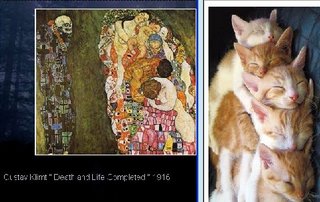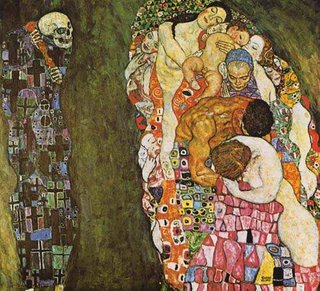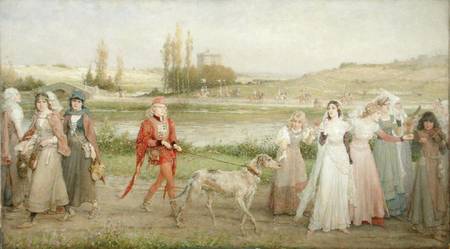UNDERSTANDING DREAMS


Gustav Klimt " Death and Life Completed " 1916
Dreams
In my experience, there is a wealth of material hidden in everyone`s dreams. In the rush to invalidate Freud`s theories, researchers have reduced his groundbreaking work on dreams to mere literature, philosophizing. Dreams have been attributed to the random firing of neurons, to upset stomachs, to various aches and pains. Researchers attempting to use the "scientific method" have discovered remarkable correlates between brain functioing and observed maladaptive behavior such as schizophrenia, depression, bi-polar disorder. Many of these researchers would disagree with my use of the term "correlates". It is their belief that it will eventually be possible to explain all human behavior as a reflection of brain activity.
The work of clinicians who report their findings in individual case studies, psychiatrists and psychologists who accept the brain researchers` findings as neurological correlates, not as causality, is dismissed as "soft research". My 30 years experience as a clinical psychologist has always been defined by viewing man as something more than his/her overt behavior, yet at the same time acknowledging the inherent power of the scientific method. In fact, my dissertation was an early attempt to measure subjective "existential" values using advanced statistical techniques. All of this said, I believe that dreams address both individual and group concerns.
In my experience, depending on the individual`s state of mind and psychological makeup, there are three levels of interpretation that can be analyzed from some but not all dreams. The level of interpretation is directly related to the depth that the dream may reach before the individual`s anxiety tolerance forces wakefulness.
A person`s ability to tolerate anxiety while dreaming seems somewhat fluid, depending on their mental state while awake. A person feeling relatively stress-free, with a good mental outlook, will be more open to experience deeper levels of the dream experience. It is also my belief that individuals who have been open to the creative process are more amenable to experience their dreams at the deepest level.
The first level of a dream generally is referenced to the individual`s daily life. The happenings of the previous days[s] present themselves to the dreamer in fairly undisguised form, easily open to free association.
However, if the dreamer remains sleeping, his/her personal unresolved conflicts become part of the dream pattern. It is at this level that many of us experience repetitive dreams as the ego continually tries to remove the cathected [bound] libidinal energy from earlier unresolved conflicts in our life. Dream interpretation through free association is especially valuable here as these unresolved conflicts and their cathected energy constitute much of our defensive posture. It is the unresoved, anxiety arousing earlier experiences that define our personality, that posture that allows others to define us and helps narrow our exposure to similar experiences. In dreaming, we are generally awakened at this point; the cathected energy often appears as anxiety, causing nightmares and/or restlessness.
Finally, and rarely, there is a level of dreaming that is archtypical, that is part of all of us, the stuff of thousands of years of animal experience. Only the most courageous and those most open to the creative experience will generally see more than a glimpse of these primitive id strivings before nightmares drive us to wakefulness. These are the dreams of the human unsocialized, dreams that reveal our strivings toward immortality. Dreams that define us as human and condemn us to death and finiteness.
V





